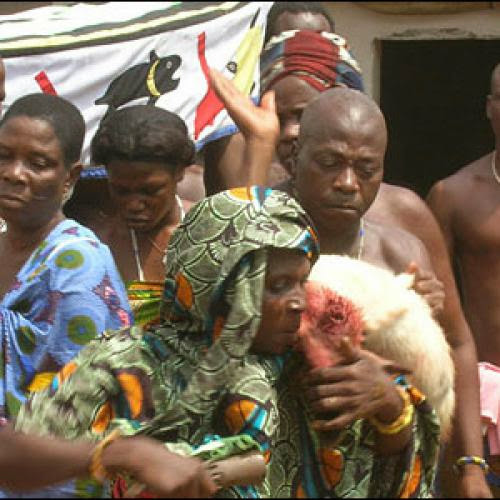
It may reasonably be doubted whether any other negro of African birth who lived in the South had a more extraordinary career than that of Jean Montanet. He was a native of Senegal, and claimed to have been a prince's son, in proof of which he was wont to call attention to a number of parallel scars on his cheek, extending in curves from the edge of either temple to the corner of the lips. This fact seems to me partly confirmatory of his statement, as Berenger-Feraud dwells at some length on the fact that the Bambaras, who are probably the finest negro race in Senegal, all wear such disfigurations. The scars are made by gashing the cheeks during infancy, and are considered a sign of race. Three parallel scars mark the freemen of the tribe; four distinguish their captives or slaves. Now Jean's face had, I am told, three scars, which would prove him a free-born Bambara, or at least a member of some free tribe allied to the Bambaras, and living upon their territory. At all events, Jean possessed physical characteristics answering to those by which the French ethnologists in Senegal distinguish the Bambaras. He was of middle height, very strongly built, with broad shoulders, well-developed muscles, an inky black skin, retreating forehead, small bright eyes, a very flat nose, and a woolly beard, gray only during the last few years of his long life. He had a resonant voice and a very authoritative manner.
Jean's ideas of religion were primitive in the extreme. The conversion of the chief tribes of Senegal to Islam occurred in recent years, and it is probable that at the time he was captured by slavers his people were still in a condition little above gross fetichism. If during his years of servitude in a Catholic colony he had imbibed some notions of Romish Christianity, it is certain at least that the Christian ideas were always subordinated to the African--just as the image of the Virgin Mary was used by him merely as an auxiliary fetich in his witchcraft, and was considered as possessing much less power than the "elephant's toof." He was in many respects a humbug; but he may have sincerely believed in the efficacy of certain superstitious rites of his own. He stated that he had a Master whom he was bound to obey; that he could read the will of this Master in the twinkling of the stars; and often of clear nights the neighbors used to watch him standing alone at some street corner staring at the welkin, pulling his woolly beard, and talking in an unknown language to some imaginary being. Whenever Jean indulged in this freak, people knew that he needed money badly, and would probably try to borrow a dollar or two from some one in the vicinity next day.
Testimony to his remarkable skill in the use of herbs could be gathered from nearly every one now living who became well acquainted with him. During the epidemic of 1878, which uprooted the old belief in the total immunity of negroes and colored people from yellow fever, two of Jean's children were "taken down. I have no money," he said, "but I can cure my children," which he proceeded to do with the aid of some weeds plucked from the edge of the Prieur Street gutters. One of the herbs, I am told, was what our creoles call the "parasol. The children were playing on the banquette next day," said my informant.
Montanet, even in the most unlucky part of his career, retained the superstitious reverence of colored people in all parts of the city. When he made his appearance even on the American side of Canal Street to doctor some sick person, there was always much subdued excitement among the colored folks, who whispered and stared a great deal, but were careful not to raise their voices when they said, "Dar's Hoodoo John!" That an unlettered African slave should have been able to achieve what Jean Bayou achieved in a civilized city, and to earn the wealth and the reputation that he enjoyed during many years of his life, might be cited as a singular evidence of modern popular credulity, but it is also proof that Jean was not an ordinary man in point of natural intelligence.
Books You Might Enjoy:
Rabbi Michael Laitman - The Open Book
Albert Pike - The Book Of The Words







